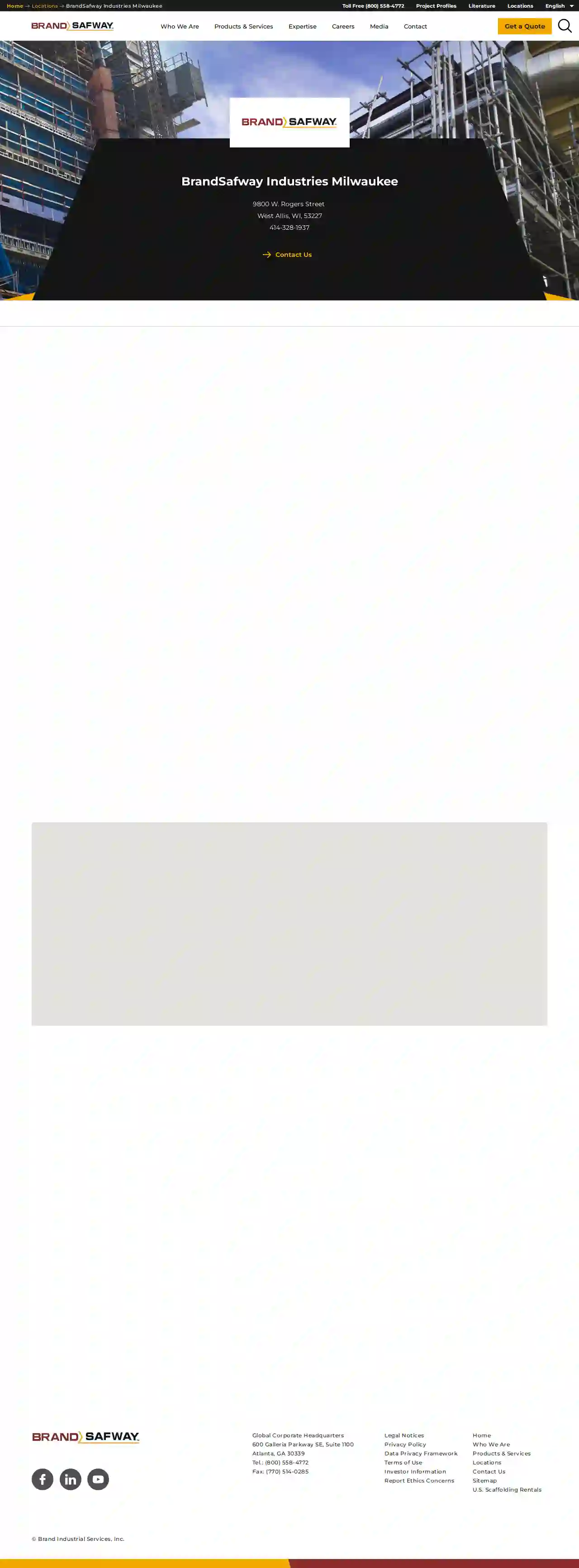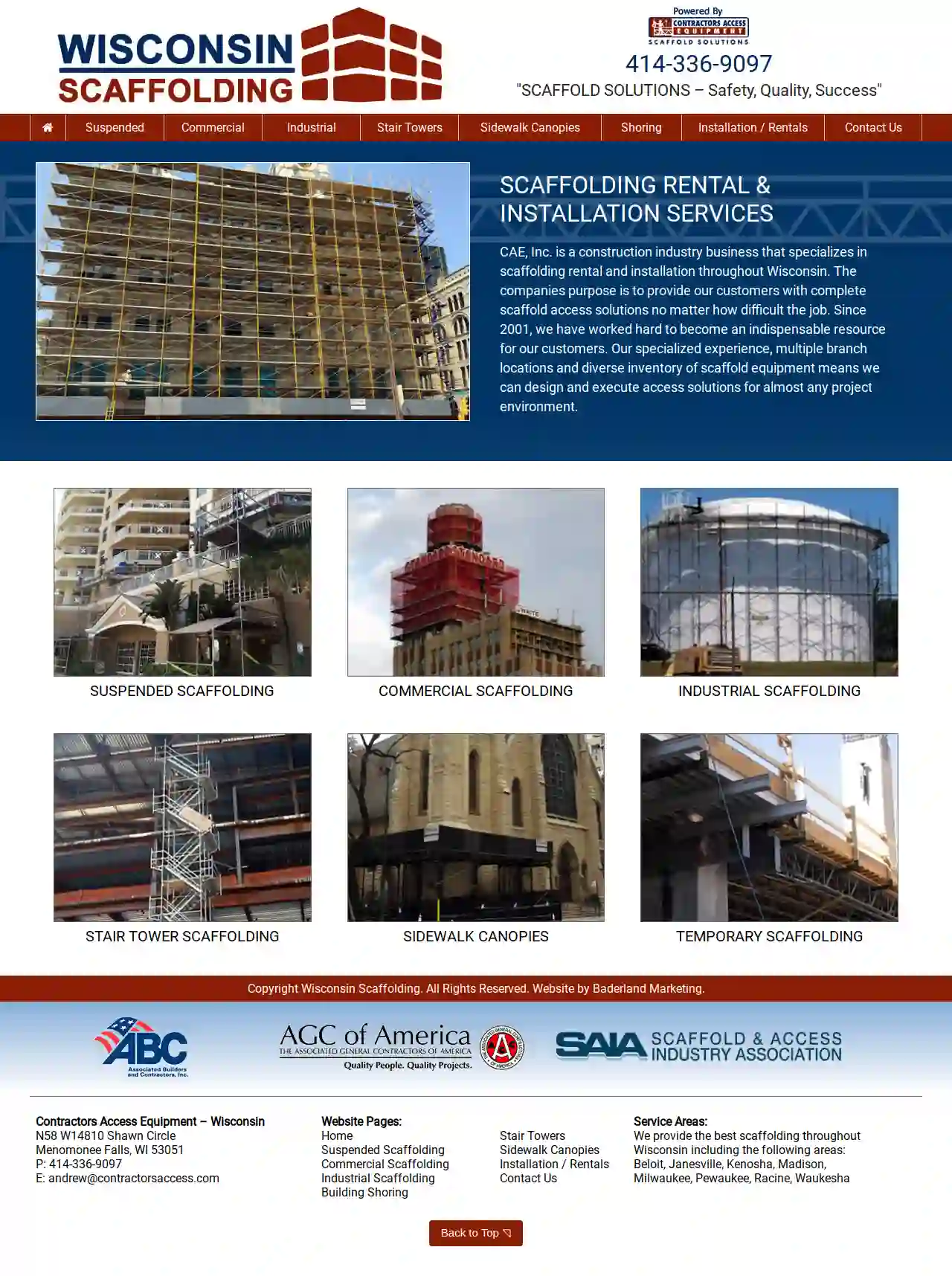Scaffolding Companies Edgerton
Find the best Scaffolding Companies in Edgerton
Get up to 3 Scaffolding Company quotes for your project today! Compare profiles, reviews, accreditations, portfolio, etc... and choose the best deal.

API Construction
51 reviews2725 S 163rd Street, New Berlin, 53151, USAPi Construction is a trusted scaffold and high-reach equipment expert in Milwaukee, Wisconsin. We provide safe, reliable, and high-quality access equipment, scaffold, accessories, and safety training for contractors. Our commitment to safety is the essence of how we perform our best and safest projects. We believe that zero injuries are achievable and the expectation of our company. We offer a variety of scaffold rental and expert design solutions, including custom-engineered scaffold solutions with erection and dismantle services. Our team of skilled scaffold engineers and designers provides total end-to-end support of your scaffold requirements, no matter the project scope. We are proud to be powered by the APi Group and are ready to serve your projects in Wisconsin and the surrounding area.
- Services
- Why Us?
- Accreditations
- Our Team
- Gallery
Get Quote
Badger Ladder LLC
4.637 reviewsMilwaukee, USBadger Ladder is a trusted supplier of scaffolding for sale, ladders, and pump jacks, with nearly 30 years of industry experience. Our scaffolding products offer customizable heights for easier access to difficult areas, and are built to last. We provide various types of scaffolding, including cross braces, stacking pins, and scaffold planks to meet all your project needs. Our scaffolding for sale online offers the advantages of powder-coat paint, preventing rust, and a cope-welded design for enhanced strength. Designed to meet the demands of any workload, our scaffolding is suitable for both interior and exterior use.
- Services
- Why Us?
- Gallery
Get Quote
BrandSafway Industries Milwaukee
410 reviews1234 Industrial Drive, Milwaukee, 53203, USBrandSafway is a leading provider of access solutions, including scaffolding, aerial work platforms, and forming and shoring. With a strong commitment to safety, quality, and customer satisfaction, BrandSafway offers a wide range of services tailored to meet the unique needs of clients across various industries. Their team of experienced professionals works closely with clients to understand their requirements and deliver customized solutions that enhance efficiency and productivity. BrandSafway is dedicated to providing innovative access solutions that ensure safe and efficient project execution.
- Services
- Why Us?
- Accreditations
- Our Team
- Testimonials
Get Quote
Wisconsin Scaffolding
Menomonee Falls, WI, N58 W14810 Shawn Circle, 53051, USContractors Access Equipment, Inc. (CAE) is a construction industry business specializing in scaffolding rental and installation throughout Wisconsin. Since 2001, CAE has worked hard to become an indispensable resource for customers. With specialized experience, multiple branch locations, and a diverse inventory of scaffold equipment, CAE can design and execute access solutions for almost any project environment. CAE provides the best scaffolding throughout Wisconsin, including Beloit, Janesville, Kenosha, Madison, Milwaukee, Pewaukee, Racine, and Waukesha.
- Services
- Why Us?
- Accreditations
- Our Team
- Testimonials
- Gallery
Get Quote- Br
BrandSafway Industries Wisconsin Rapids
44 reviewsMilwaukee, US- Services
- Why Us?
Get Quote
Over 2,353+ Scaffolding Companies in our network
Our scaffolding experts operate in Edgerton and beyond!
ScaffoldingHQ has curated and vetted the Best Scaffolding Businesses in and around Edgerton. Find the most reliable business today.
Frequently Asked Questions About Scaffolding Companies
- Tube and Clamp Scaffolding: A traditional and versatile system using individual tubes and clamps. It's highly adaptable but requires more time to erect.
- System Scaffolding: Pre-engineered systems with modular components that fit together quickly. They offer speed and efficiency, especially for larger projects.
- Suspended Scaffolding: Hung from a roof or overhead structure, ideal for high-rise buildings or areas with limited ground access.
- Mobile Scaffolding: Mounted on wheels, allowing easy movement around a worksite. Suitable for tasks like painting or plastering.
- Specialized Scaffolding: Cantilever scaffolding, rolling towers, and other specialized systems cater to specific needs.
- Mobile Elevated Work Platforms (MEWPs): Scissor lifts, boom lifts, and other MEWPs offer flexible access for specific tasks.
- Mast Climbing Work Platforms (MCWPs): Ideal for high-rise construction, providing a stable working platform that can be raised incrementally.
- Suspended Access Equipment: Ropes and harnesses used for specific tasks like window cleaning or façade repairs.
- Ladders and Step Ladders: For shorter durations and limited working heights, provided they are used safely and appropriately.
- A temporary structure with a larger platform for workers and materials.
- Offers greater stability and working space.
- Suitable for tasks requiring movement and multiple workers.
- Used for higher elevations and more complex projects.
- Used for reaching specific points at height for short durations.
- Less stable than scaffolding, requiring more caution and balance.
- Not suitable for tasks involving heavy materials or extended work periods.
- Experience and Expertise: Look for companies with a proven track record in your type of project, whether it's residential, commercial, or industrial.
- Licensing and Insurance: Verify that the company has the necessary licenses and insurance coverage to operate legally and protect you from liability.
- Safety Record: Inquire about their safety practices and training programs for their employees. A strong safety culture is crucial in scaffolding.
- Reputation and Reviews: Check online reviews and testimonials from previous clients to gauge their reliability and quality of work.
- Professionalism: Choose a company that communicates clearly, provides detailed quotes, and demonstrates a commitment to customer satisfaction.
What are the different types of scaffolding?
What are some alternatives to traditional scaffolding?
What is the difference between a scaffold and a ladder?
Scaffolding:
How do I find a reputable scaffolding company?
What are the different types of scaffolding?
- Tube and Clamp Scaffolding: A traditional and versatile system using individual tubes and clamps. It's highly adaptable but requires more time to erect.
- System Scaffolding: Pre-engineered systems with modular components that fit together quickly. They offer speed and efficiency, especially for larger projects.
- Suspended Scaffolding: Hung from a roof or overhead structure, ideal for high-rise buildings or areas with limited ground access.
- Mobile Scaffolding: Mounted on wheels, allowing easy movement around a worksite. Suitable for tasks like painting or plastering.
- Specialized Scaffolding: Cantilever scaffolding, rolling towers, and other specialized systems cater to specific needs.
What are some alternatives to traditional scaffolding?
- Mobile Elevated Work Platforms (MEWPs): Scissor lifts, boom lifts, and other MEWPs offer flexible access for specific tasks.
- Mast Climbing Work Platforms (MCWPs): Ideal for high-rise construction, providing a stable working platform that can be raised incrementally.
- Suspended Access Equipment: Ropes and harnesses used for specific tasks like window cleaning or façade repairs.
- Ladders and Step Ladders: For shorter durations and limited working heights, provided they are used safely and appropriately.
What is the difference between a scaffold and a ladder?
Scaffolding:
- A temporary structure with a larger platform for workers and materials.
- Offers greater stability and working space.
- Suitable for tasks requiring movement and multiple workers.
- Used for higher elevations and more complex projects.
- Used for reaching specific points at height for short durations.
- Less stable than scaffolding, requiring more caution and balance.
- Not suitable for tasks involving heavy materials or extended work periods.
How do I find a reputable scaffolding company?
- Experience and Expertise: Look for companies with a proven track record in similar projects, whether it's residential, commercial, or industrial.
- Licensing and Insurance: Verify that the company has the necessary licenses and insurance coverage to operate legally and protect you from liability.
- Safety Record: Inquire about their safety practices and training programs for their employees. A strong safety culture is crucial in scaffolding.
- Reputation and Reviews: Check online reviews and testimonials from previous clients to gauge their reliability and quality of work.
- Professionalism: Choose a company that communicates clearly, provides detailed quotes, and demonstrates a commitment to customer satisfaction.